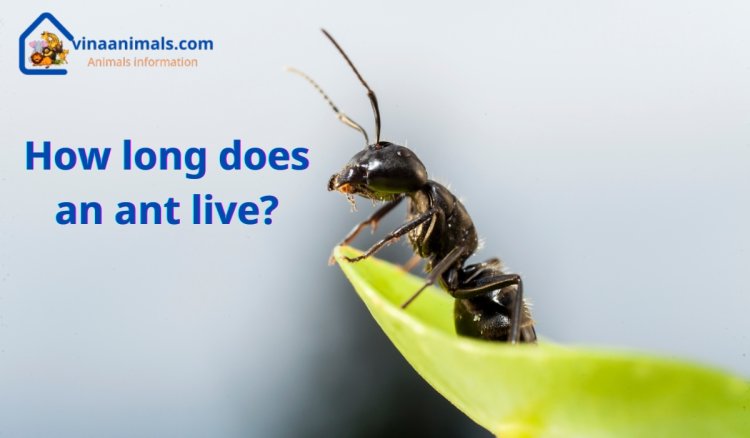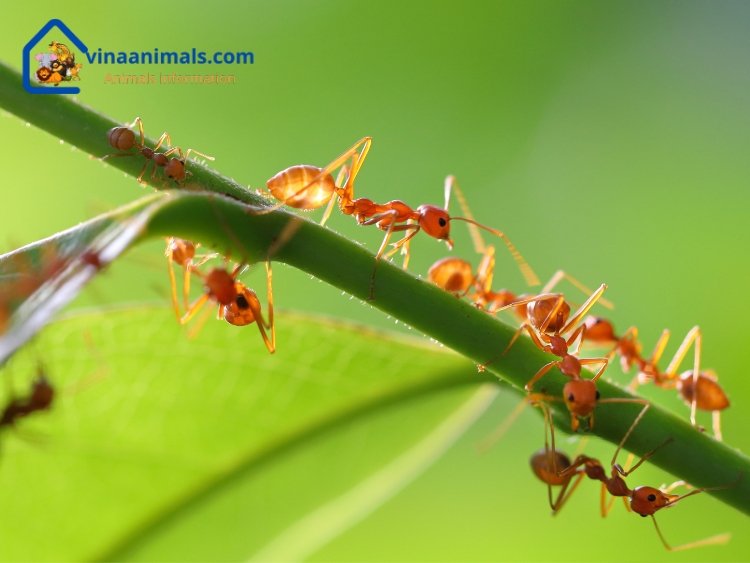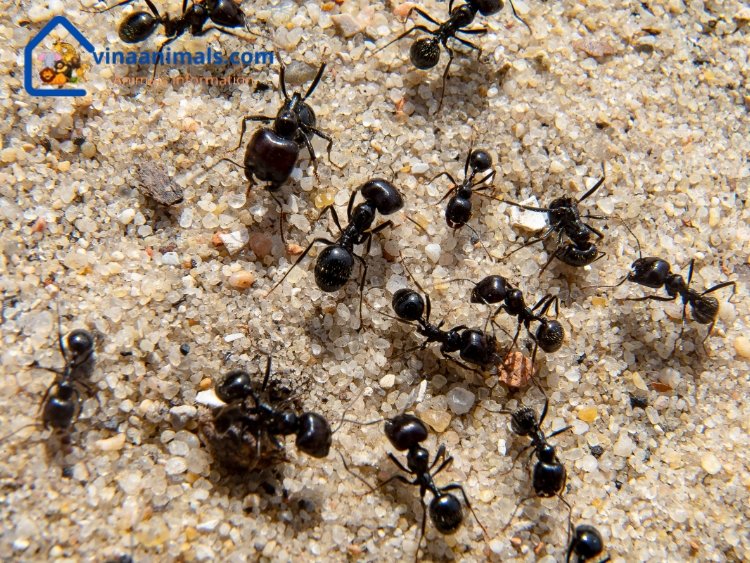How long does an ant live? Learn about the lifespan of ants
Table of contents [Show]
How long do ants live? Do male and female ants have different ages? The following article of vinaanimals will help you better understand the age of ants.

How long does an ant live?
The lifespan of an ant can vary significantly depending on the species and its role within the colony. On average, worker ants typically live for a few weeks to several months. Queens, on the other hand, can live much longer, ranging from a couple of years to even a few decades in some cases. Male ants generally have the shortest lifespan, often surviving only a few weeks.
It's important to note that the lifespan of an ant is influenced by factors such as environmental conditions, availability of food, predation, and the overall health of the colony. Different ant species have evolved different lifespans based on their reproductive strategies, roles within the colony, and the challenges they face in their specific habitats.

Factors affecting the lifespan of ants
The lifespan of ants can be influenced by a variety of factors: species, role in the colony, and the environment in which they live,... Here are factors that can affect the lifespan of ants:
- Species: Different ant species have evolved with varying lifespans. Some species are short-lived, while others have longer lifespans. This is often linked to their reproductive strategies and the demands of their specific ecological niche.
- Role in the Colony: The role an ant plays within the colony can significantly impact its lifespan. Worker ants, which perform tasks such as foraging, caring for young, and defending the colony, tend to have shorter lifespans. Queen ants, responsible for laying eggs and sustaining the colony, generally live longer.
- Environmental Conditions: The environment in which an ant colony resides can greatly affect lifespan. Harsh conditions, such as extreme temperatures, lack of food, or exposure to predators, can shorten the lifespan of ants. Conversely, ants in more favorable environments may live longer.
- Reproductive Strategy: The reproductive strategy of the ant species plays a role. Queen ants, for instance, have longer lifespans as they are responsible for laying eggs and founding new colonies. Male ants, whose primary purpose is to mate, tend to have shorter lifespans.
- Diet and Nutrition: The availability and quality of food sources can influence the health and longevity of ants. Adequate nutrition can lead to healthier individuals with longer lifespans, while a lack of food can lead to premature death.
- Predation: Ants are prey for many other animals, including birds, spiders, and insects. The risk of predation can impact their lifespan, as ants living in areas with high predation pressure may have shorter lives.
- Social Structure: Some ant species have complex social structures with distinct castes (such as workers, soldiers, and queens) that have different lifespans. The reproductive division of labor affects the overall colony's survival and longevity.
- Habitat: Ants that live in different habitats, such as forests, deserts, or urban areas, face varying challenges and opportunities. These habitat-specific factors can impact their overall lifespan.
- Genetics: Genetic factors influence an ant's overall health and ability to resist diseases. Strong genetic traits can contribute to a longer lifespan.
- Colony Health: The overall health and stability of the ant colony can impact individual ant lifespans. A well-functioning and healthy colony is more likely to produce individuals that live longer.
Is the lifespan of male and female ants different?
Yes, the lifespan of male and female ants can differ significantly. In most ant species, the lifespan of males is generally shorter compared to that of females.
The different roles of male and female ants lead to a difference in their lifespan. Males have a focused purpose of mating. While females, whether workers or queens, contribute to the ongoing activities and maintenance of the colony.
Lifespan of Male Ants
Male ants, also known as drones, have the primary purpose of mating with a queen to ensure the continuation of the colony. Once they successfully mate, their life's purpose is fulfilled, and they usually die shortly afterward. In many ant species, the lifespan of male ants can be as short as a few days to a few weeks. This short lifespan is due to the energy-intensive nature of mating and their limited role in the colony's activities.
Lifespan of Female Ants (Workers and Queens)
Female ants, which include both the worker caste and the queen caste, can have longer lifespans. Workers, responsible for tasks like foraging, caring for the young, and defending the colony, often live for several weeks to a few months, depending on the species and environmental conditions. On the other hand, queen ants, responsible for laying eggs and founding new colonies, can live much longer. Queen ants' lifespans can vary widely, ranging from a couple of years to several decades in some cases, depending on the species and their reproductive success.

What happens to an ant as it ages?
Ants do not experience senescence in the same way as mammals, but they might exhibit signs of aging.
Worker ants
Older worker ants may show decreased mobility and slower responses to stimuli. They might retire from foraging and focus more on activities within the nest. Eventually, their tasks may shift towards caring for the queen, younger ants, or the nest environment.
In certain species, older worker ants might even be used as living storage units, storing food or serving as a source of nutrition for the colony.
The lifespan of worker ants can vary greatly, and once they can no longer contribute effectively to the colony, they might die naturally or be sacrificed for the greater good.
Queen Ants
Queen ants are unique in that they experience a dramatic physiological change when they become reproductive.
Once mated, a queen's primary role becomes egg laying. Depending on the species, she can lay thousands to millions of eggs over her lifetime.
Queen ants generally continue to live and lay eggs as long as they remain healthy and the colony thrives.
Male Ants
Male ants have a short and specific purpose - to mate with a queen.
Once they have successfully mated, they die shortly afterward, completing their life cycle.
How long do ants live? Depending on the species and different factors will determine the lifespan of ants. Male ants have the shortest lifespan, while queens usually live a long time. Hopefully this article has helped you gain more interesting information about the lifespan of ants.









![Do Ants Have Teeth? How Many Teeth Do Ants Have? [Do You Know?]](https://vinaanimals.com/uploads/images/2023/09/image_380x226_65070de7b10e6.jpg)
